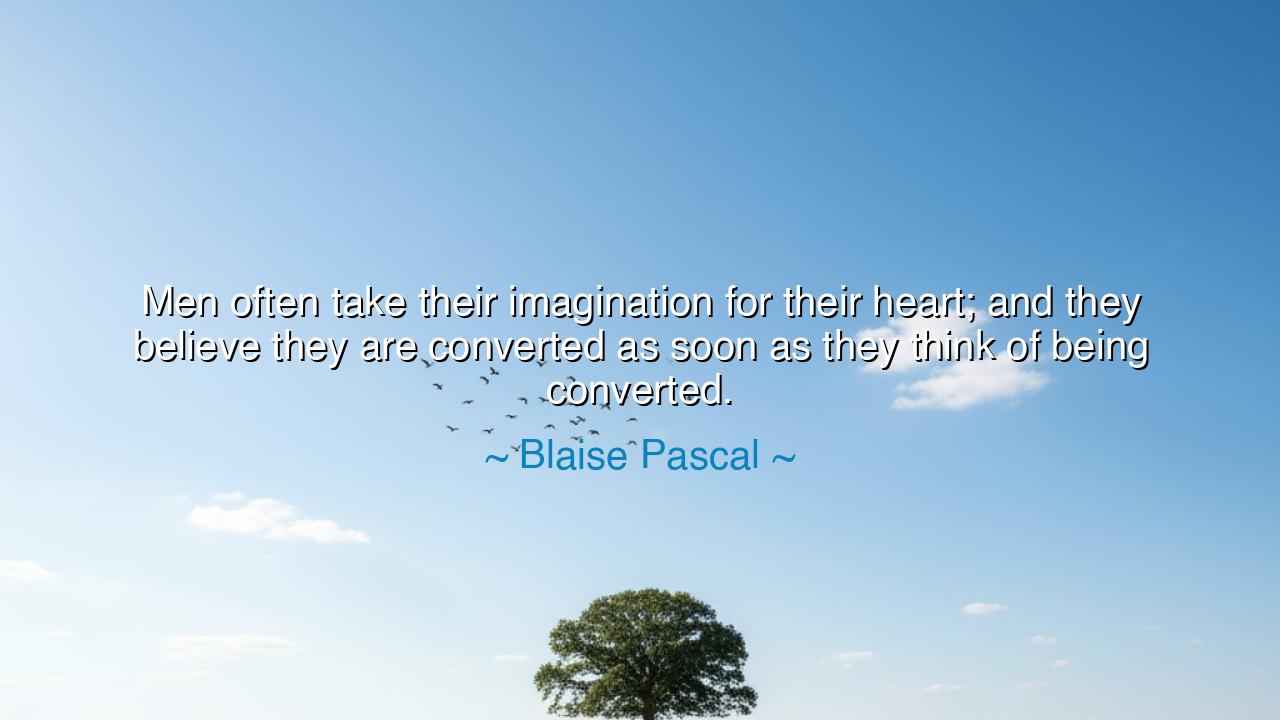
Men often take their imagination for their heart; and they
Men often take their imagination for their heart; and they believe they are converted as soon as they think of being converted.






“Men often take their imagination for their heart; and they believe they are converted as soon as they think of being converted.” Thus spoke Blaise Pascal, the philosopher of paradox and faith, whose mind bridged the realms of science and spirit. In this piercing truth, Pascal lays bare the deception that so easily overtakes the human soul — the confusion between imagination and conviction, between thinking and being. He warns that transformation, whether moral, spiritual, or emotional, does not dwell in fleeting thoughts or grand visions, but in the living depths of the heart, proven through endurance, humility, and action.
To imagine goodness is easy; to become good is the labor of a lifetime. The mind can conjure noble images of itself — a saint, a hero, a wise man — and for a moment, bask in the warmth of its own illusion. We mistake this vision for virtue, thinking that because we see the light, we already walk in it. This is the trap Pascal warns of: the mind’s capacity to imitate the heart, to produce the appearance of transformation without its substance. True conversion, in whatever form, demands more than imagination — it demands surrender. The mind may dream of change, but only the heart, when tested, proves it.
Pascal himself knew this conflict intimately. Before his famous “night of fire,” he lived as a man of intellect and reason, accomplished and admired. But in that one mystical encounter with the divine, he felt what he had long contemplated: the overwhelming, living truth of faith. He recorded it in trembling words: “Fire. God of Abraham, God of Isaac, God of Jacob — not of the philosophers and the scholars.” It was a revelation that transcended his imagination. From that moment on, he knew what his own mind had failed to grasp — that conversion is not the act of thinking differently, but of being changed. It is not the mind’s idea of light, but the soul’s encounter with it.
History gives us many who, like Pascal, wrestled with the same deception. Consider St. Augustine, whose early life was filled with the brilliance of intellect and the indulgence of the senses. He could speak of virtue, imagine purity, reason about faith — yet none of these made him virtuous, pure, or faithful. It was not until his heart broke under the weight of his own hypocrisy, until the cry “Take and read” led him to surrender his will, that true conversion took root. His transformation did not begin in the imagination, but in the heart — in tears, in repentance, in the fire of lived truth.
Pascal’s insight extends beyond religion into every human striving. How often does a man believe he loves because he imagines himself loving? How often does a woman believe she forgives because she pictures forgiveness? In all things, the imagination paints a noble self-portrait, and we believe in its likeness. But love, forgiveness, courage, and faith are not thoughts — they are acts of the will, habits of the soul. The dream of virtue is effortless; the living of it is the furnace where the false self is burned away. The heart, not the imagination, is where truth is tested and proven.
This, then, is the heart of Pascal’s wisdom: the imagination is a deceiver when it pretends to be the heart. It whispers, “You are already good, already changed,” and in that comfort, progress dies. The heart, however, speaks differently. It demands humility, perseverance, and sacrifice. It asks not what you think, but what you choose. It does not dazzle with visions, but disciplines with quiet acts of constancy — the forgiveness that costs you pride, the patience that costs you time, the love that costs you self. True conversion, then, is not a single moment of inspiration, but a daily death of illusion.
The lesson, dear soul, is clear: beware of mistaking imagination for transformation. Let not your thoughts of virtue become a substitute for virtue itself. When you feel the stirrings of change, do not rest in their warmth — act upon them. Practice what you imagine until the heart confirms what the mind has conceived. Seek not the thrill of spiritual vision, but the quiet strength of spiritual discipline. For in the end, it is not what you think that sanctifies you, but what you live.
So let Pascal’s words stand as both mirror and warning: the imagination can imitate the light, but only the heart can bear it. To live truth, one must descend from the clouds of thought into the ground of the soul, where the roots of faith, love, and passion take hold. Only there, in the hidden labor of the heart, does the false glow of imagination give way to the enduring fire of true conversion — a fire that does not flicker with fancy, but burns eternal in the depths of being.






AAdministratorAdministrator
Welcome, honored guests. Please leave a comment, we will respond soon